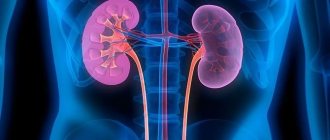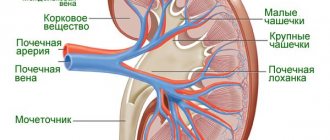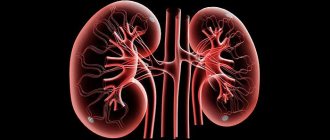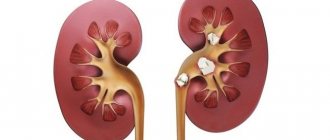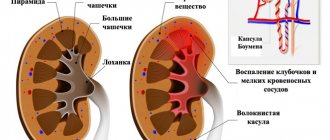Hypothermia, poor nutrition, taking medications, congenital structural features - these and many other reasons can cause diseases of the excretory organs. Symptoms that the kidneys are not working well arise spontaneously or gradually. At an early stage of development, diseases can be treated with homeopathy and nutritional adjustments, but if pathological processes are ignored, the entire body becomes intoxicated, treatment takes longer or becomes useless.
Why do the kidneys work poorly?
Dysfunction of the excretory organs affects the functioning of the body and human well-being. Violations occur for a number of reasons. Most common:
- Hereditary predisposition. Nephropathies associated with gene mutations are hereditary.
- The presence of an inflammatory process in the body. When performing the filtering function from the blood, pathogenic microorganisms enter the excretory organs, provoking the development of inflammation.
- Prolonged hypothermia contributes to the development of pyelonephritis.
- Increased content of protein, fat, salt in food.
- Alcohol abuse.
- Intensive weight loss. Adipose tissue “envelops” the organs, preventing hypothermia, shaking, and vibration. Tissue depletion leads to destabilization of the kidneys.
- Taking medications with nephrotoxic effects.
- Urinary retention causing the bladder to become overfilled; constipation, which is the cause of general intoxication of the body.
Women are most susceptible to developing diseases of the urinary system. The reason lies in the structural features of the male and female body: the width and length of the urinary tract in men is greater, which makes it difficult for infections to penetrate into the excretory organs.
The peak incidence occurs in the cool season. Chronic diseases are accompanied by inflammation due to hypothermia.
Characteristic manifestations
Symptoms of kidney failure vary and depend on the stage of kidney failure. With the death of a small part of the nephrons, the performance of the organs remains virtually unchanged. But the more parenchyma is replaced by connective tissue, the brighter the signs of intoxication.
Changes in urine
Kidney failure is accompanied by a decrease in glomerular filtration rate. Impaired urinary formation leads to changes in urine characteristics.
Primary signs of kidney failure:
- decrease in daily diuresis - no more than ½ liter of urine;
- darkening of urine;
- proteinuria – the presence of protein in the urine.
With chronic renal failure, the daily volume of urine increases to 2.5 liters, but its density decreases. Due to the accumulation of urea in it, a specific odor occurs.
Anemia
Kidney tissue secretes erythropoietin, a hormone that controls the formation of red blood cells. But if the functioning of organs is disrupted, the concentration of red blood cells in the blood decreases. Anemia manifests itself:
- pale skin;
- dizziness;
- taste disturbance;
- brittle hair.
Due to the lack of red blood cells, gas exchange in the tissues is disrupted; they do not receive the required amount of oxygen. Therefore, patients complain of fatigue.
Increased blood pressure
Due to acute fluid retention and impaired production of renin (an organic substance that regulates blood pressure), 50% of people develop arterial hypertension. Dysregulation of blood pressure is indicated by:
- pain in the back of the head;
- tachycardia;
- excessive sweating;
- chills;
- dizziness.
Hypertension is dangerous due to hypertensive crisis, circulatory disorders in the brain and death.
Pain
Kidney damage is indicated by sharp or dull pain just above the lower back. Painful sensations intensify when consuming large amounts of liquid and excessive exercise. If renal failure is caused by infectious cystitis or urethritis, pain spreads to the perineum and inner thighs.
Fluid stagnation
Delayed urination and accumulation of toxins lead to disruption of the acid-base balance and osmotic pressure in the blood plasma. When it begins to leak through the walls of blood vessels, the following occurs:
- swelling of the limbs;
- puffiness of the face;
- abdominal dropsy.
Half of the patients are diagnosed with pulmonary edema caused by congestive heart failure and hypertension.
Signs of intoxication
If the kidneys fail, the concentration of creatinine, urea, nitrogenous substances, protein breakdown products, carbohydrates, etc. increases in the blood. Poisoning of the body is indicated by:
- thirst;
- smell of urine from the mouth;
- dry skin;
- decreased appetite;
- nausea;
- diarrhea;
- stomach ache.
Intoxication is often accompanied by bloating, vomiting and a white coating on the tongue.
Bleeding gums
Violation of the rheological properties of blood and decreased elasticity of blood vessels leads to bleeding gums. Blood can be seen when eating hard foods, brushing teeth, or using floss.
To understand the cause of the disease, you should consult a nephrologist. Timely identification and elimination of provoking factors prevents irreversible changes in the parenchyma.
Hormonal disorders
The kidneys are one of the components of the endocrine system. They synthesize:
- calcitriol;
- erythropoietin;
- renin
If these hormones stop flowing into the blood, hormonal disorders occur. They are manifested by arterial hypertension, anemia, osteoporosis, and lipid metabolism disorders. Calcitriol deficiency increases the risk of psoriasis, vitiligo, and cancer.
Itchy skin
As intoxication increases, allergic reactions occur in the form of painful skin itching. The symptom occurs predominantly in decompensated and terminal stages of sluggish renal failure.
Nervous system disorders
The accumulation of metabolic products in the blood leads to dysfunction of the nervous system, which manifests itself:
- absent-mindedness;
- insomnia;
- memory loss;
- lethargy;
- sudden change in mood;
- muscle cramps;
- confusion.
With age, the performance of the urinary system decreases. An older person's kidneys clear toxins from the blood at a slower rate. According to statistics, after 45-50 years, the glomerular filtration rate decreases by 0.75 ml/min over 1 year.
How can you tell if your kidneys are not working well?
External manifestations of kidney dysfunction are associated with changes in their activity. The accumulation of fluid and the appearance of edema is a consequence of impaired excretory function.
If endocrine function is disrupted, hypertension develops and the cardiovascular system malfunctions. The excretory organs secrete the hormone renin. Thanks to it, normal blood circulation is maintained and sodium levels are regulated.
If problems with bone tissue begin, weight increases due to impaired carbohydrate metabolism, the reason being the deterioration of the functioning of the excretory organs. They are involved in metabolism, converting vitamin D to D3.
Deterioration in well-being may be the result of a shift in the acid-base balance of the blood plasma, a change in the concentrating ability of the kidneys due to impaired osmotic function.
Working not at full capacity, the excretory organs cease to efficiently filter the blood from toxins, wastes, bacteria, which, circulating throughout the body, have a poisonous effect on all functional human systems.
Signs of deteriorating kidney function
To prevent diseases from developing to the stage of irreversibility, you should know the general symptoms of poor kidney function. These include:
- The occurrence of edema. If a person experiences a sudden change in weight throughout the day, the problem is the removal of fluid from the body.
- Increased blood pressure. The reason is an increase in the production of pressor substances due to kidney dysfunction.
- Fever, increased body temperature.
- Pale skin.
- Deterioration in health: fatigue, loss of appetite.
In addition to general ones, there are local signs of violations:
- the appearance of unevenness (protrusion) of the skin in the lumbar region;
- pain in the area of the kidneys;
- change in the color of urine: normally the liquid is light yellow (brighter in the morning, from coloring products), but if there is a cloudy sediment, blood impurities, excessive pallor, you should get tested;
- urodynamic disturbance: the urge to urinate becomes more frequent or decreases; Pain during urine flow is often observed.
These signs appear as a group or individually. It depends on which disease is progressing.
Signs of kidney pathologies in children
Kidney disease in a child can be recognized by its condition. Discomfort in the lumbar region forces you to frequently change body position. The child becomes lethargic, capricious, and refuses to eat. Inflammatory processes can cause an increase in temperature, which is often associated with the development of acute respiratory infections.
Attention should be paid to the indicators of the child’s urine: smell, color, transparency. Turbidity and unnatural color are signs of kidney problems.
Blood pressure has increased - run to check your kidneys
Hypertensive syndrome is another common manifestation of kidney disease. According to statistics, chronic pathology of the paired bean-shaped organ is diagnosed in 20-30% of hypertensive patients. This is typical for chronic glomerulonephritis, vascular nephrosclerosis, renal amyloidosis, etc. Due to the increased production by the kidneys of a special protein substance - renin, their blood supply is disrupted with the formation of arterial hypertension. When renin interacts with hypertensinogen, angiotensin is formed. It is highly active and increases vascular tone in the periphery, thereby increasing the pressure in the arteries.
If you have identified one of the above symptoms, then consult a specialist as soon as possible to conduct the necessary examination.
Tweet
Characteristics of common renal pathologies
Each disease has its own set of symptoms. They show themselves most clearly:
- Urolithiasis disease. At the stage of stone formation, the pathology may not manifest itself in any way, but when they leave the body, renal colic occurs. They are accompanied by severe sharp pains, covering the lumbar region, lower abdomen, radiating to the legs. When sand or stone comes out, the pain does not subside when changing body position, body temperature and blood pressure rise. Urination may be difficult. Grains of sand or small stones are found in the urine, and blood may appear.
- Pyelonephritis is an inflammation of the kidney tissue resulting from bacterial damage. Women most often suffer from pyelonephritis after cystitis, men - from prostatitis, prostate adenoma. Characteristic signs of the development of the disease are an increase in body temperature within the subfebrile level (up to 38˚), nagging pain in the lower back.
- Glomerulonephritis is an inflammation of the kidneys caused by autoimmune disorders. The disease occurs after illnesses of viral and bacterial etiology. Symptoms appear gradually and are not pronounced. The lower back immediately begins to hurt, blood pressure rises, then nausea, weakness, vomiting, and headache appear. The color of the urine becomes dark brown. Unlike pyelonephritis, which can be easily cured by taking antibacterial drugs, glomerulonephritis can be treated for a long time in a hospital.
- Chronic renal failure develops in chronic pathologies and autoimmune diseases. There is a decrease in the functional abilities of nephrons—the cells of the excretory organs. The disease is manifested by the occurrence of swelling on the face and legs, a feeling of constant dryness in the mouth, a decrease in the volume of urine excreted, and a persistent increase in blood pressure. The results of renal failure are disturbances in the functioning of the gastrointestinal tract, changes in the functioning of the heart. The patient experiences arrhythmia, tachycardia, shortness of breath when doing physical exercise, and later when walking, and is bothered by pressing pain in the area of the heart.
Causes of acute and chronic renal failure
The reason for kidney failure lies in the negative impact on the kidney tissue (parenchyma) of toxic substances - metal salts, medications, bacterial waste products. The death of nephrons provokes stagnation of urine and insufficient blood circulation in the organs of the urinary system. The acute form of the disease is provoked by the following factors:
- heart failure;
- persistent diarrhea;
- arrhythmia;
- decreased blood pressure;
- pyelonephritis;
- interstitial nephritis;
- atherosclerosis;
- extensive burns;
- nephrotoxic drugs;
- urolithiasis disease;
- glomerulonephritis;
- cardiogenic shock;
- rectal tumors;
- BPH;
- tuberculous lesions of the bladder;
- acute blood loss;
- cirrhosis of the liver.
Kidney failure is a pathological condition that is caused by the progressive death of nephrons.
Leads to dysfunction of other organs and systems due to increasing intoxication with toxic substances. Chronic renal failure (CRF) in 87% of cases is the outcome of indolent diseases:
- glomerulonephritis;
- diabetic glomerulosclerosis;
- jade;
- diabetes mellitus;
- urolithiasis.
Slow inflammation of the parenchyma leads to the death of nephrons. And the fewer there are, the brighter the symptoms. Chronic renal failure is provoked by:
- rheumatoid arthritis;
- systemic lupus erythematosus;
- polycystic kidney disease;
- ureteral abnormalities;
- gout;
- prostate cancer;
- systemic scleroderma;
- urinary tract tumors.
In half of the cases, chronic renal failure is preceded by prolonged inflammation of the parenchyma. Over time, it is replaced by connective tissue.
Diagnosis and prevention of diseases
A nephrologist diagnoses kidney diseases. You can also consult a therapist if you feel unwell.
Initially you will need to submit:
- Analysis of urine. Urine for general analysis is collected on an empty stomach and sent to the laboratory within 2 hours. Based on the results, the development of inflammatory processes and renal failure can be determined.
- General blood analysis.
Ultrasound diagnostics makes it possible to recognize stones, inflammations, and neoplasms.
Important! Ultrasound is the safest and simplest examination method, which is suitable for adults and children from birth.
X-ray examinations will help assess the condition of the tissues and blood vessels of the kidneys.
The most accurate research methods indicated when diagnosis is difficult are CT and MRI.
How to prevent kidney disease
Even if abnormalities in the functioning of the excretory organs are detected, they can be eliminated by timely taking medications and adjusting the diet.
For kidney diseases, as well as a tendency to develop pathologies, it is recommended:
- Monitor your diet. An abundance of salt, foods high in fat, and abuse of protein foods have a detrimental effect on kidney function. It is recommended to avoid salt completely and use apple cider vinegar or lemon as an alternative.
- Drink at least 1.5-2 liters of liquid per day.
- Resort to massage and exercises that increase blood circulation in the lumbar region.
- Dress according to the weather, avoiding hypothermia.
To prevent the development of kidney problems, it is recommended to take a general urine test at least once a year, and with an increased risk of morbidity - 2 times a year.
The body's signals about kidney dysfunction cannot be ignored, since any disease is easier to eliminate at an early stage of development.
Guys, we put our hearts into Bright Side. Thank you for revealing this beauty. Thanks for the inspiration and goosebumps. Join us on Facebook and VKontakte
Every day our brain processes tons of information, and our body performs thousands of actions. Due to the frantic pace of life, it is very easy to miss the signals for help that the body sends. And ignoring health problems can lead to serious consequences.
Bright Side has compiled a list of signs that indicate your kidneys are not working properly.
Sleep problems
When your kidneys are not functioning properly, toxins are not eliminated from the body through urine and remain in the blood. Increased levels of toxins cause insomnia. Therefore, if you are not sleeping well, there is a possibility of kidney problems.
Be careful: People with chronic kidney disease are more likely to suffer from sleep apnea. This is a disorder that causes pulmonary ventilation to cease for more than 10 seconds during sleep. After each pause, normal breathing returns with a loud snort. Continuous heavy snoring is a sign that you should see a doctor.
Headaches, fatigue and general weakness
Healthy and properly functioning kidneys synthesize vitamin D in our body to strengthen bones and produce the hormone erythropoietin. It plays an important role in the formation of red blood cells. When the kidneys are not functioning well, they produce less erythropoietin. Decreased levels of red blood cells, which carry oxygen in the blood, lead to muscle and brain fatigue.
Be careful: Anemia is common in people with kidney problems. It can develop when kidney function decreases by 20–50%. If you get enough rest and sleep but continue to feel tired and weak, you should contact your doctor immediately.
Dry and itchy skin
Healthy kidneys remove harmful substances and excess fluid from the blood, helping to produce red blood cells and maintaining the required amount of minerals in the body. Itchy and dry skin indicates an inability of the kidneys to maintain the proper balance of minerals and nutrients, which can lead to bone and kidney disease.
Be careful: If you have dry and itchy skin, try using moisturizing creams. Remember: Before taking any medications for itching, you should consult your doctor. Some medications contain ingredients that can cause further harm to your kidneys.
Bad breath and metallic taste
When harmful substances accumulate in the blood, the taste of food changes and a metallic taste appears in the mouth. Bad breath is another sign of high levels of toxins in the blood. There is also a chance of losing your appetite, which can lead to unhealthy weight loss.
Be careful: There are various reasons why food may taste metallic, ranging from allergies to poor oral health. As a rule, it should disappear if these factors are eliminated. If the taste remains, you should consult a doctor.
Irregular breathing
The link between kidney disease and shortness of breath, especially after mild exertion, is due to two factors. First, excess fluid in the body ends up in the lungs when the kidneys are not working well. Secondly, anemia deprives the body of oxygen, which leads to shortness of breath.
Be careful: There are various causes of shortness of breath, from kidney failure to asthma, lung cancer or heart disease. If you notice that you are constantly short of breath after exerting a little effort, you should see a doctor immediately.
Swelling of ankles and hands
Kidneys that do not function correctly do not remove excess fluid from the body. This leads to sodium retention, which causes swelling in the ankles, feet and hands. Swelling in the lower body may also indicate heart disease, liver disease, or venous problems.
Be careful: Taking the necessary medications, reducing salt intake and removing excess fluid from the body can stop the swelling. If this does not help, you should consult your doctor.
Swelling of the hands, feet and ankles
When the kidneys do not filter as well as necessary, excess fluid is not removed from the body. Thus, sodium retention is formed in it, leading to swelling of the hands and feet. As for the lower part of the body, swelling localized in it may indicate cardiovascular diseases or problems with the veins.
Advice: reduce the amount of salt you consume, then excess liquid will not be retained in the body. If this method does not work, go to the doctor.
How the kidneys work
The main functions of the organ include filtering blood and removing waste products in the urine.
The kidneys play an important role in the functioning of the body.
The following processes are carried out with their participation:
The parenchyma contains nephrons, which act as a filter for blood. Nephrons are made up of small blood vessels (arterioles) and thin tubes. Blood saturated with toxins and waste products moves into the arterioles. Harmful substances settle in the tubes, after which they enter the pelvis - a cavity for storing urine. When enough urine has collected in the pelvis, it enters the ureter and then into the bladder.
A complex process as a result of which the required volume of fluid is retained in the kidneys and toxic substances are eliminated.
- Regulation and maintenance of water-alkaline balance.
The human body contains a certain amount of water. Its deficiency or excess can lead to serious health problems. The blood must have optimal concentration. Excess salts and water are removed by the kidneys as a result of filtration.
- Stabilization of blood pressure.
Blood pressure may increase as a result of more water in the blood. The kidneys remove excess fluid. Pressure and electrolytic balance are maintained due to the production of a special enzyme and prostaglandins by the kidney parenchyma.
- Regulation and maintenance of acidic environment.
The elimination of excess salts and acids by the kidneys prevents the formation of an environment favorable for the growth of bacteria.
- Formation of hormones and calcitriol.
The kidneys produce hormones that control the formation of red blood cells. Calcitriol regulates calcium-phosphorus metabolism.
Blood in urine - when is it really dangerous?
Blood present in urine does not necessarily indicate any serious illness. In people who do not suffer from diseases, the presence of red cells in the urine can be observed after heavy physical work and no correction is required. It also happens that parents mistake the presence of urate crystals in the urine of babies for blood and start panicking, but it’s all about uric acid infarction of the kidney - a physiological phenomenon that does not require specialized treatment. Blood in the urine can also appear when a stone moves from various parts of the kidney to the ureters and then into the urine reservoir. With its departure, all visible symptoms of hematuria cease on their own.
Another thing is that if bacteria enter the genitourinary system, malignant and benign tumors of the urinary tract and kidneys appear. In these cases, you cannot do without the help of doctors. The infection is treated with antibiotics, and in case of malignant neoplasms they are often removed along with the organ. But hematuria is only an indirect sign of renal failure. The fact is that it can also be provoked by blood diseases, liver failure, hemophilia, and taking certain medications.
Causes of dysfunction
The reasons why the kidneys do not work well can be grouped into three groups.
- Lifestyle and human behavior.
Risk factors associated with an unhealthy lifestyle include:
- promiscuous sexual intercourse, which leads to infection with sexually transmitted diseases;
- hypothermia of the lumbar region;
- improper diet - excess fatty, spicy, smoked, salty foods;
- drinking alcoholic beverages.
Reasons beyond a person’s control include poor environmental conditions in the region of residence and hereditary predisposition.
These are factors caused by pathologies in the organ itself. Kidney function is impaired in the following cases:
- poisoning;
- kidney diseases: thrombosis of organ vessels, nephritis, renal failure, heart attack and others;
- damage;
- kidney operations.
- Prerenal causes.
Manifestations of hypofunction are associated with the inability of blood vessels to maintain normal blood pressure.
Irregular breathing
The link between kidney disease and shortness of breath, especially after mild exertion, is due to two factors. First, excess fluid in the body ends up in the lungs when the kidneys are not working well. Secondly, anemia deprives the body of oxygen, which leads to shortness of breath. Be careful: There are various causes of shortness of breath, from kidney failure to asthma, lung cancer or heart disease. If you notice that you are constantly short of breath after exerting a little effort, you should see a doctor immediately.
Signs of poor kidney function
When the kidneys don't work well, the symptoms vary. When it comes to kidney diseases, all signs are divided into two groups: general and local.
General symptoms include symptoms characteristic of any organ pathology. Local symptoms occur depending on the specific disease.
Among the common symptoms, renal colic is the most common. The duration of the pain syndrome can vary - from several minutes to several hours.
The pain intensifies with sudden movement or standing up. It is the presence of pain during renal colic that is the reason for the patient to consult a doctor.
Discomfort is felt in the lower back, inner thighs and radiates to the genital area. The presence of sand and blood clots in the urine should alert you.
General symptoms include:
- intense headache;
- loss of appetite;
- increased body temperature;
- fever, chills;
- pale skin;
- swelling of the eyelids in the morning;
- arterial hypertension;
- fatigue, malaise, fatigue;
- malfunction.
Poisoning the body with toxins - how does it manifest itself?
If the kidneys hurt, then they do not perform their cleansing function 100%, and this inevitably leads to blood contamination with toxins. The presence of intoxication can be determined by the following signs:
- loss of appetite and feeling of weakness;
- itching of the skin and rash, irritation, peeling;
- changes in taste sensations, in particular, a metallic taste in the mouth;
- apathy, irritation, bad mood; fatigue and heaviness in the muscles;
- headaches;
- sleep disturbance;
- decreased concentration, decreased performance;
- decreased immunity.
Consequences of kidney dysfunction
If kidney function is poor, there is a high risk of developing kidney failure. If left untreated, the disease may have the following consequences:
- development of infectious inflammation of the organ;
- decreased hormone production;
- increased blood pressure.
Kidney dysfunction affects the functioning of other organ systems:
- nervous (tremor of limbs, convulsions);
- respiratory (pulmonary edema);
- musculoskeletal (bone fragility);
- circulatory (anemia);
- cardiovascular (stroke, heart attack).
Backache
Kidney problems can lead to back pain, which can be felt just below the rib cage. It can be felt in the front of the groin or in the thigh area. Pain in the back and legs can occur due to the formation of cysts in the kidneys - large sacs filled with fluid. Tip: Back pain caused by kidney failure is accompanied by a feeling of nausea, vomiting, high body temperature and frequent urination. Back pain, which has no correlation with the kidneys, is felt differently: it is localized and occurs suddenly, without an increase in temperature. If your back continues to hurt and the pills do not help, you should consult a doctor.
Features of kidney diseases in children
When a child’s kidneys hurt, parents may not immediately guess the reason for the change in behavior. When unpleasant sensations appear in the lumbar region, children become capricious and experience pain during urination. The urine becomes cloudy and smells unpleasant.
If kidney function is poor, the child refuses to eat. He complains of abdominal pain. Body temperature rises. There are no signs of a cold or acute respiratory viral infection.
Early diagnosis of the disease and subsequent treatment will help avoid the development of complications and alleviate the child’s condition.
Diagnosis
In the initial stages, kidney disease usually has no obvious symptoms. The only way to determine their level of performance is to undergo an examination. This is especially important if you have diabetes, hypertension, heart disease, and if there are relatives in the family with a similar kidney problem.
The sooner the diagnosis is made, the sooner treatment will be prescribed to protect the kidneys.
To diagnose the presence of kidney disease, doctors prescribe:
Diagnosis of disorders
In the early stages of kidney dysfunction, it is difficult to determine that there is a problem. How to understand that your kidneys are not working well? A doctor (urologist, nephrologist) will help identify problems and prescribe appropriate diagnostic procedures.
The patient must undergo urine and blood tests (biochemical and general). To obtain a detailed clinical picture, ultrasound and MRI, excretory urography are performed.
Using these methods, it is possible to identify the pathological process and determine the extent of organ damage.
Main stages
Kidney dysfunction occurs in two forms: chronic and acute. They, in turn, are divided into 4 stages:
- Conservative. With it, dysfunction occurs gradually and does not flow into the next stage quickly. Mildly expressed symptoms appear associated with chronic pathologies, which are the root causes of kidney failure. If you ignore the symptoms of the disorder and do not start treatment, it may progress to the terminal stage, which is more dangerous for the body.
- Terminal. It is characterized by the development of uremic syndrome with its characteristic:
- general weakness;
- headache and muscle pain;
- itching of the skin with the formation of ulcers;
- the appearance of swelling;
- vomiting, nausea;
- ammonia odor from the mouth;
- hearing and smell impairments;
- increased irritability;
- insomnia; high blood pressure;
- malfunction of the kidneys and liver, lungs and heart.
- Latent, characterized by minimal manifestations in the form of increased fatigue during physical activity, evening weakness, changes in the composition of urine, in which the presence of protein is detected.
- Compensatory, in which complaints about poor health become more frequent, the feeling of discomfort does not leave, the composition of urine and blood changes.
What to do if your kidneys are working poorly
If you experience symptoms of poor kidney function, you should consult a doctor. He will order an examination and determine the cause of the violations.
Depending on what caused the organ dysfunction, complex treatment is prescribed. It is aimed at eliminating the cause of the disease, relieving symptoms and normalizing the patient’s condition.
He may be prescribed the following groups of drugs:
- painkillers, antispasmodics;
- anti-inflammatory drugs;
- drugs that dissolve stones for nephrolithiasis;
- antibiotics for bacterial infectious processes;
- drugs that lower blood pressure;
- medications for intravenous use that restore and maintain acid-base and water-salt balance;
- diuretics.
It is necessary to follow a dietary diet. Dishes containing large amounts of salt are excluded. Smoked, spicy and fried foods are also prohibited.
Carbonated drinks, strong tea and coffee are replaced with plain still water and green tea. More vegetables and fruits are introduced into the diet.
Following a diet is mandatory for urolithiasis. Depending on the type of stones, nutrition is prescribed.
Along with diet, traditional medicine methods are used in the treatment of diseases. Decoctions and tinctures prepared according to folk recipes will not get rid of diseases, but they will improve the patient’s condition and help when the kidneys are not working well.
Before use, consult a doctor.
Problems falling asleep
Improperly functioning kidneys indicate that toxins do not leave the body along with urine, remaining in the blood. This makes it difficult to fall asleep. That is why it is so necessary to get enough sleep, because this can have the most beneficial effect on the functioning of the kidneys.
Warning: Most often, people with a history of chronic kidney disease suffer from apnea. This condition is characterized by pauses in breathing during sleep, lasting from a few seconds to a minute. The return to normal breathing is accompanied by severe snoring. This is a reason to see a doctor.
How to prevent kidney disease
Patients suffering from diseases of the urinary system are advised to maintain a healthy lifestyle and take preventive measures.
Active activity, properly organized nutrition, drinking plenty of fluids (2 liters of water) will improve the condition of the kidneys. Avoid prolonged exposure to drafts and prevent hypothermia.
It is better to identify kidney dysfunction at an early stage and begin treatment than to be treated for a long time from the consequences.
High blood pressure
The circulatory system and the kidneys depend on each other. The kidneys have nephrons that filter harmful substances and remove excess fluid from the blood. If the blood vessels are damaged, the nephrons do not receive enough oxygen and nutrients. Therefore, high blood pressure is the second leading cause of kidney failure. Tip: It is important to control your blood pressure to avoid kidney failure. You should add foods rich in folic acid to your diet, as it is involved in the production of red blood cells and will help prevent anemia.
General and local symptoms
All symptoms that are observed in kidney diseases can be divided into 2 large groups - these are general symptoms and local ones.
Most often, renal colic makes itself felt; it can last only a couple of minutes or torment the patient for several hours. Usually it is colic that is the reason that the patient comes for examination. An alarming signal is the appearance of blood, sand, and small stones in the urine, which is accompanied by pain not only in the lumbar region, but also in the inner thigh and even the genitals.
General symptoms:
- Strong headache;
- malaise, fatigue, severe fatigue;
- appetite worsens;
- fever, severe chills;
- swelling of the eyes appears in the morning, especially severe in the eyelid area;
- the skin becomes pale;
- blood pressure and body temperature rise.
Local symptoms include a larger number of signs. They are not always pronounced, so even the slightest discomfort must be treated carefully, especially if such phenomena begin to recur. Local symptoms of kidney diseases include:
- redness of the skin in the area where the kidneys are projected;
- pain that is observed in the lumbar region on one or both sides, depending on the lesion;
- bulges observed in the lumbar region;
- constant urge to urinate, there may be blood in the urine;
- urine may be cloudy or too pale;
- When urinating, burning, itching, and pain occur.
